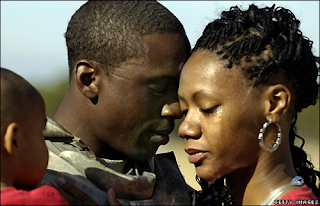 |
| An American soldier greets his wife and son after returning home from a 14-month deployment to Iraq (Getty Images), BBC News |
***
Nineteen million veterans (2014 census) of war live among us in America, yet what do we do to help them transition from military life to civilian life? First, learn about their experience.Here are two stories told by people who experienced war as active participants.
Wes Moore: How to talk to veterans about the war
***
***
Sebastion Junger: Why veterans miss war
***
***
Journalist Sebastian Junger wrote about veterans returning from war an opinion piece in the Washington Post:
Civilians tend to do things that make them, not the veterans, feel better. Yellow ribbons and parades do little to help with the emotional aftermath of combat. War has been part of human culture for tens of thousands of years, and most tribal societies were engaged in some form of warfare when encountered by Western explorers. It might be productive to study how some societies reintegrated their young fighters after the intimate carnage of Stone Age combat. It is striking, in fact, how rarely combat trauma is mentioned in ethnographic studies of cultures.
Typically, warriors were welcomed home by their entire community and underwent rituals to spiritually cleanse them of the effect of killing. Otherwise, they were considered too polluted to be around women and children. Often there was a celebration in which the fighters described the battle in great, bloody detail. Every man knew he was fighting for his community, and every person in the community knew that their lives depended on these young men. These gatherings must have been enormously cathartic for both the fighters and the people they were defending. A question like the one recently posed to me wouldn’t begin to make sense in a culture such as the Yanomami of Brazil and Venezuela or the Comanche.
-- Marge

No comments:
Post a Comment